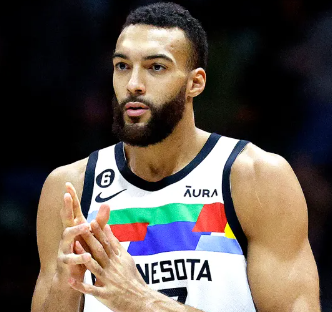The debate between Kendrick Perkins and Rudy Gobert’s postseason effectiveness underscores a broader discussion about the true value of regular-season awards versus playoff performance
While Gobert’s regular-season accolades are impressive, the criticisms highlight the necessity for players to adapt and excel in the more intense, strategically varied environment of the playoffs.
As the NBA continues to evolve, the scrutiny on players like Gobert will persist, especially from analysts like Perkins who emphasize the importance of showing up when it matters most.
Whether Gobert can silence his critics with a deep playoff run or championship win remains to be seen, but the dialogue around his postseason performance is sure to continue.
Rudy Gobert’s contributions to the Timberwolves extend far beyond the occasional playoff struggles against elite offensive players. His defensive impact, as evidenced by critical metrics, highlights his value to the team.
While Kendrick Perkins’ critiques bring attention to areas for improvement, they do not diminish Gobert’s overall significance. For the Timberwolves, Rudy Gobert remains an indispensable asset, anchoring their defense and providing the foundation for future success.
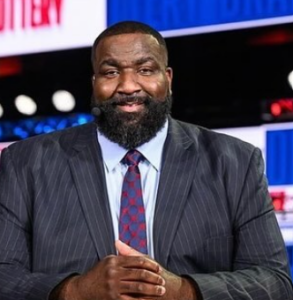
Also Read: Donovan Mitchell & Rudy Gobert: Are They Linked to Epstein Island? Debunked The Rumors
Table of Contents
Kendrick Perkins’ Harsh Critique of Rudy Gobert
Kendrick Perkins did not hold back in his criticism of Rudy Gobert, even after the Minnesota Timberwolves managed to dethrone the Denver Nuggets in the first round of the playoffs.1
Perkins expressed regret over voting for the Frenchman as the Defensive Player of the Year, stating he felt embarrassed by his decision. The former NBA player-turned-analyst accused Gobert of tarnishing the prestigious award.
Gobert’s Performance in the Playoffs
Perkins’ critique of Gobert, a four-time Defensive Player of the Year (DPOY), extended into the Western Conference finals against the Dallas Mavericks.
Joining a popular sentiment, Perkins argued that Gobert becomes unplayable during the playoffs, particularly when tasked with guarding elite players like Luka Doncic and Kyrie Irving.
In an interview with “Scoop B” Robinson, Perkins elaborated on his views regarding Gobert’s postseason performance:
“Why not? Why not?! You cannot be going back to France with four Defensive Player of the Year awards and not show up in the postseason. People thought I was capping. I had a better postseason, defensively, than Rudy [Gobert].
I’m talking about career-wise. … If you go back and watch film, I showed up in big moments. I didn’t have a Defensive Player of the Year award. I showed up in big moments. He didn’t, man.”
Comparing Playoff Careers: Perkins vs. Gobert
When the Boston Celtics secured the Larry O’Brien Trophy in 2008, Kendrick Perkins averaged 6.6 points, 6.1 rebounds, and 1.3 blocks per game.
Perkins was the Celtics’ starting center, contributing significantly to their then-record 17th championship, won against the Lakers.
Perkins’ best postseason came in 2009, where he averaged 11.9 points, 11.6 rebounds, and 2.6 blocks over 14 games.
The Celtics had a strong chance to clinch back-to-back championships, bolstered by Perkins’ impressive form.
However, their aspirations were dashed when Kevin Garnett suffered a knee injury, compromising his performance in the 2009 rematch with the Lakers.
Gobert’s Postseason Stats
Rudy Gobert, on the other hand, has never won a championship. Nevertheless, his postseason statistics are notably superior to Perkins’ career figures.
Gobert has averaged 13.2 points, 11.0 rebounds, and 1.6 blocks in 69 playoff games. His most outstanding playoff performance came in 2021, with averages of 14.7 points, 12.3 rebounds, and a league-leading 2.1 blocks per game.
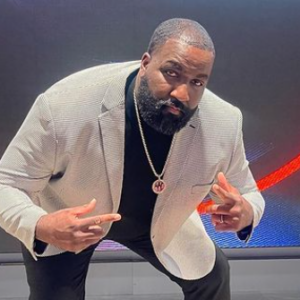
Rudy Gobert’s Impact on the Timberwolves
Debunking Kendrick Perkins’ Criticisms
Rudy Gobert, the towering Frenchman, has made significant strides with the Minnesota Timberwolves this season, contrary to the sharp critiques from former NBA player and analyst Kendrick Perkins.2
While Perkins highlighted Gobert’s struggles against elite players like Nikola Jokic and Luka Doncic during the playoffs, it’s essential to contextualize these performances and understand the true value Gobert brings to his team.
Understanding the Defensive Challenge
It’s no secret that even the most formidable defenders can struggle against all-time offensive talents. Historically, legends like Michael Jordan, LeBron James, Kobe Bryant, and Steph Curry have managed to break through elite defenses, making their mark regardless of the opposition.
Rudy Gobert’s career has seen him match up against some of the game’s most explosive and deadly scorers, which naturally leads to occasional tough outings.
I know some Boston fans are in their feelings… but yall be will aight. I’m back home baby for the Finals and my first stop was to tap in with the @RedSox ???????????? https://t.co/54TziNo2c0
— Kendrick Perkins (@KendrickPerkins) June 4, 2024
Gobert’s Defensive Prowess in Numbers
Kendrick Perkins might have overlooked some critical statistics that highlight Gobert’s importance to the Timberwolves. When Gobert is on the floor with the starters, Minnesota boasts a net rating of 12.4.
This impressive figure starkly contrasts with the -5.0 net rating when Naz Reid, the Sixth Man of the Year, steps in for Gobert. This drop underscores Gobert’s defensive impact and the challenges the team faces without him anchoring the defense.
Dominance in the Playoffs
In the playoffs, the Timberwolves outscore their opponents by 118 points per 100 possessions when Rudy Gobert is in the middle. However, this number plummets to -58 when he sits out, resulting in a massive 176-point difference.
This margin is the widest on the team, with Anthony Edwards having the second-best point difference of 96. These statistics clearly show Gobert’s critical role in the team’s success and how his presence elevates their performance.
The Perkins Critique: A Balanced View
Kendrick Perkins is correct in pointing out some of Rudy Gobert’s playoff shortcomings. However, his recent criticisms seem to have missed the broader picture.
Gobert’s defensive contributions and his ability to anchor the Timberwolves’ defense are vital elements that shouldn’t be overshadowed by a few tough matchups against elite scorers.
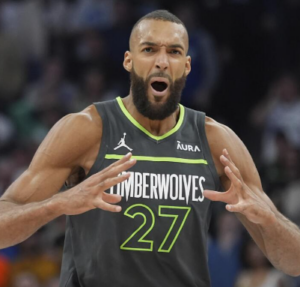
Rudy Gobert’s Overall Impact
Rudy Gobert’s arrival in Minnesota was met with high expectations, given his decorated career as a three-time NBA Defensive Player of the Year.
His shot-blocking ability, defensive IQ, and rebounding prowess have transformed the Timberwolves into a more formidable defensive unit.
Despite facing criticism, Gobert has continued to prove his worth on the court through his consistent performances and undeniable impact on the team’s defensive metrics.
The Importance of Context in Player Analysis
Analyzing a player like Rudy Gobert requires a nuanced understanding of the game. While it’s easy to highlight moments of failure against top-tier talents, it’s equally important to recognize the overall contributions a player makes.
Gobert’s presence alters opponents’ game plans, forces difficult shots, and provides his team with a reliable defensive backbone.
As the Timberwolves look towards future playoff runs, Rudy Gobert’s role will remain crucial. The team will need his defensive acumen and experience to navigate the challenges posed by high-caliber opponents.
Additionally, integrating Gobert’s strengths with the offensive talents of players like Anthony Edwards will be key to achieving sustained success.
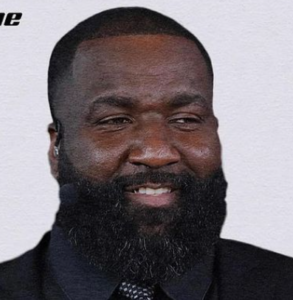
Also Read: Rudy Gobert (Basketball): Bio, Wiki, Age, Career, Relationship, Net Worth 2024 and More
Kendrick Perkins: Bio
From NBA Champion to ESPN Analyst
Kendrick Le’Dale Perkins, born on November 10, 1984, made a name for himself as a dominant force in the NBA.3
Today, he is not only remembered for his on-court prowess but also for his insightful commentary as a sports analyst for ESPN.
Let’s delve into the journey of this former American professional basketball player, tracing his path from high school sensation to NBA champion and respected sports analyst.
Early Life
Kendrick Perkins’s basketball journey began at Clifton J. Ozen High School in Beaumont, Texas.
His exceptional skills and physical presence on the court quickly garnered attention, leading to his decision to enter the 2003 NBA Draft directly from high school.
In the draft, Perkins was selected by the Memphis Grizzlies but was immediately traded to the Boston Celtics, where he would spend the first eight years of his NBA career.
Perkins became known for his defensive prowess and tenacity on the court, earning him a key role in the Celtics’ championship run in 2008.
During his time with the Celtics, Perkins formed a formidable frontcourt duo with Kevin Garnett, anchoring the team’s defense and providing a physical presence in the paint.
His contributions were instrumental in the Celtics’ success, including their memorable victory over the Los Angeles Lakers in the 2008 NBA Finals.
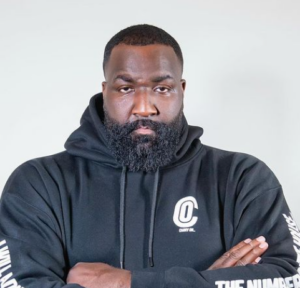
Kendrick Perkins: Career
A Basketball Journey of Grit and Resilience
Kendrick Perkins, a name synonymous with tenacity and grit in the world of basketball, embarked on a remarkable journey in the NBA.
From his early days with the Boston Celtics to his later years with the Cleveland Cavaliers and beyond, Perkins left an indelible mark on the game. Let’s delve into the highlights of his career, exploring his triumphs, setbacks, and enduring legacy.
Early Career and Boston Celtics Era
Selected as the 27th pick in the 2003 NBA draft by the Memphis Grizzlies, Perkins quickly caught the attention of basketball enthusiasts. His true breakthrough, however, came during the 2005-06 season with the Boston Celtics.
Under the mentorship of Coach Doc Rivers, Perkins honed his skills and emerged as a formidable player known for his toughness on the court.
Oklahoma City Thunder and Success
Perkins’s journey continued with the Oklahoma City Thunder in the 2010-11 season, where he showcased his prowess in pivotal matches against teams like the Washington Wizards, Toronto Raptors, and Los Angeles Clippers.
Despite facing challenges, Perkins contributed significantly to the Thunder’s success, culminating in an impressive 55 wins that season.
The Challenges and Triumphs of the 2011-12 Season
The 2011-12 season posed unique challenges for Perkins due to the collective bargaining tournament.
However, he persevered, showcasing his resilience in matches against formidable opponents like the Miami Heat and the Portland Trail Blazers. Perkins ended the season with 47 wins, a testament to his unwavering determination.
Continued Success and Playoff Performances
In the following seasons, Perkins continued to excel, demonstrating his versatility and skill on the court.
His performances in the 2012-13 and 2013-14 seasons, including standout games against the Phoenix Suns and the Utah Jazz, solidified his reputation as a formidable center.
Later Career and Retirement
As Perkins’s career progressed, he transitioned to teams like the Cleveland Cavaliers and the New Orleans Pelicans, leaving a lasting impact wherever he went. His dedication to the game was evident until his retirement from the Canton Charge in 2018.
Kendrick Perkins’s legacy extends far beyond the basketball court. His journey exemplifies resilience, determination, and a passion for the game. As fans reflect on his career, Perkins’s influence on the NBA serves as a testament to his enduring impact.
Kendrick Perkins’s career is a testament to his unwavering dedication to basketball. His journey, marked by triumphs and setbacks, inspires aspiring athletes worldwide, showcasing the true essence of sportsmanship and perseverance.
